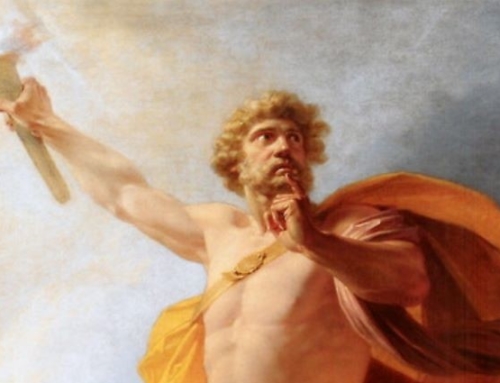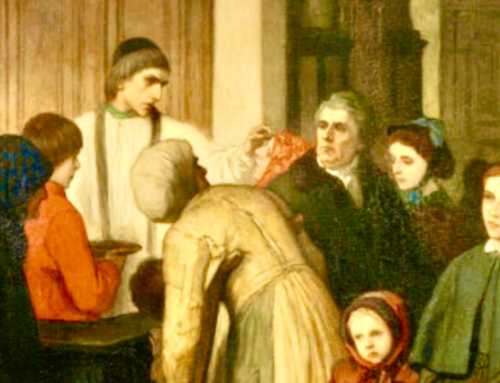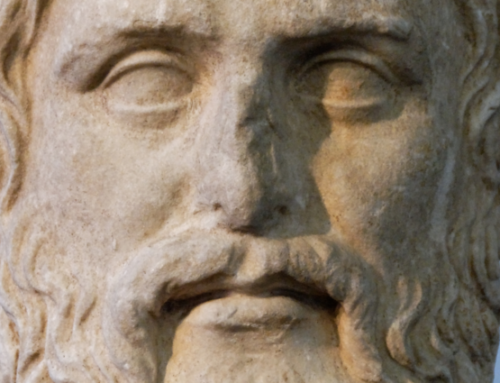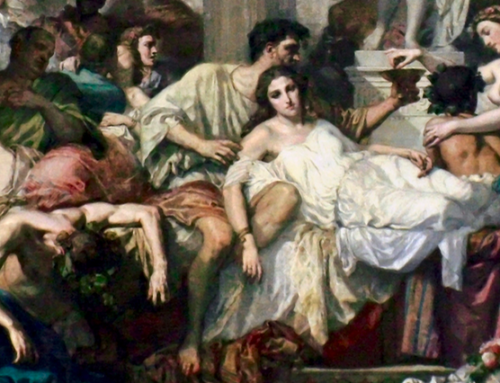The nexus between the Straussians and neoconservatives has been overstated for partisan ends, but it is still nonetheless there. Sociologically and culturally, the two movements are largely indistinguishable…
The Truth About Leo Strauss by Catherine and Michael Zuckert (University of Chicago Press, 2006).
 In The Truth About Leo Strauss, Catherine and Michael Zuckert, both professors holding endowed chairs at the University of Notre Dame, have set out to vindicate the reputation of their mentor Leo Strauss. The results reveal both a detailed and sympathetic knowledge of Strauss’s teachings and the choice of eminently deserving targets for criticism.
In The Truth About Leo Strauss, Catherine and Michael Zuckert, both professors holding endowed chairs at the University of Notre Dame, have set out to vindicate the reputation of their mentor Leo Strauss. The results reveal both a detailed and sympathetic knowledge of Strauss’s teachings and the choice of eminently deserving targets for criticism.
The Zuckerts develop a far more plausible picture of Strauss than the caricatures offered by leftist critics in the national press and by two widely quoted academic writers of censorious volumes about Strauss, Anne Norton and Shadia Drury. The Zuckerts remind us that those who should know better, like Alan Wolfe, have ascribed to Strauss a bogus “fascist” lineage. In the Chronicle of Higher Education, Dr. Wolfe condemned Strauss and his disciples for, among other blunders, being associated with me in some unexplained fashion, because of my authorship of a book on Strauss’s supposed teacher, Carl Schmitt. Dr. Wolfe, a sociologist, does not document his assertion, a task that would be impossible since the assertion is baseless.
In one particularly problematic book, John McCormick’s Carl Schmitt’s Critique of Liberalism (1997), which the Zuckerts do not cite, the Straussian pedigree is even said to extend from Schmitt through Strauss to the “extremist” Republican Congress elected in 1994. Such fantastical genealogies now abound in print, all moving in the same general direction, from Strauss’s exaggerated contacts with Carl Schmitt, a now diabolized German thinker, down to the current Republican Party, with special reference to the neoconservatives.
Although the final link in this chain seems to me more credible than the Zuckerts are willing to admit, most such condemnations function as guilt by doubtful association. The only defensible detail is that Strauss did write and publish a thoughtful commentary on Schmitt’s brilliant essay, “The Concept of the Political.” The young Strauss’s work made a favorable impression on Schmitt, who appended it to the second edition of his work in 1931. Their subsequent relationship, consisting of letters between the young German Jew and the renowned Catholic conservative scholar, was later broken off, as Schmitt (unexpectedly) threw in his lot with the triumphant Nazis. At about the same time, Strauss left Germany by way of England, eventually arriving in the United States. Whatever might have been his original politics, Strauss in his adopted homeland was a New Deal Democrat and an outspoken supporter of Adlai Stevenson. The contention that he preached European fascist ideology during his tenure at the University of Chicago is entirely unfounded.
It is difficult to overstate the uniformly low quality of the anti-Straussian polemics that the Zuckerts refute in their book. Shadia Drury, for example, penned a several hundred-page exposé trying to link Strauss in his “fascist” sympathies to the Russian radical leftist exile in France, Alexandre Kojève, as well as to Carl Schmitt. While Strauss knew these men and held a published exchange with Kojève, on Xenophon’s dialogue Hiero, Drury simply cannot demonstrate any basis for her allegations. There is nothing in Strauss’s pertinent remarks that would suggest that he agreed with Kojève, who offered an extended defense of progressive world tyranny. (Although Kojève did not return to live in Communist Russia, he was an outspoken apologist for Stalin.)
Throughout their exchange, apropos the self-pitying remarks of a Syracusan despot that might have been written by Xenophon tongue-in-cheek, Strauss and Kojève seem to be speaking past each other. Save for their personal acquaintance and knowledge of Greek sources, it is difficult to ascertain any shared intellectual ground. The Zuckerts make these observations in passing, but Drury’s misreading is so willful that it might have warranted special attention as exemplifying the interpretive gymnastics engaged in by Strauss’s leftist detractors.
The Zuckerts also have no problem assembling texts that indicate Strauss’s affection for “liberal democracy.” I myself have noted this trait while reading Strauss’s comments on Plato and Thucydides, and for forty years I have been nonplussed by the various attempts to identify Strauss with the anti-democratic far Right. His works and, even more, the impressions of his students strongly confirm his Cold War liberal mentality—coupled with Zionist sympathies. To say the least, it is problematic that such views would be understood to place their holder on the anti-modernist or anti-egalitarian side of the political spectrum, even if he also chose to comment favorably on ancient political texts.
Strauss’s favorable statements about the ancients in relation to the moderns as political thinkers, moreover, have to be read through a Straussian optic. Thus, one must first take into account the Straussian tendency to modernize ancient and medieval authors, by attributing to them philosophical skepticism of a kind that is characteristic of their interpreters. What is missing in Strauss is a historically-based insight: that Plato might have accepted metaphysical assumptions about the universe that modern intellectuals generally reject. The insistence, moreover, that earlier thinkers expressed skepticism about conventional beliefs but did so esoterically opens huge hermeneutical difficulties. There is nothing beyond conjecture that would make us believe that Straussians are able to read old texts “between the lines” in the way that is claimed. Their showcasing of this claim may add to their often questionable approach to the past an appearance of trickery or else self-deception. But the Zuckerts are correct on the larger point: Namely, that there is nothing in the methodological or cosmological perspectives of their fellow Straussians that would indicate anything specifically rightwing.
What may be the weakest point of their defense of Strauss and the Straussians, however, is their unwillingness to take on critiques that have arisen on the intellectual Right. Since the neoconservatives do not like to debate their critics on the Right, this neglect might point to a possible behavioral similarity between the Zuckerts and the neoconservatives. The authors’ insouciance allows them to avoid grappling with critics of their thought who are not establishment left-liberals.
What we are, therefore, not granted in this monograph is the pleasure of seeing the Zuckerts’ responses to such noteworthy critics of Strauss as Claes Ryn, Barry Alan Shain, Thomas Di Lorenzo, and myself (except for condescending treatment of a truncated website passage in one footnote). The disregarding of such writers, and others, might cause one to wonder whether the Straussians, who are self-proclaimed anti-historicists, are at all sensitive to historically minded critics of their work. To his credit, Michael Zuckert has written one long essay, “Natural Rights and Protestant Politics,” that indirectly responds to those with contrary opinions about the role religion played in America’s political founding. Zuckert in his response generally subsumes under “Lockeanism” any religious, biblical frame of reference that might have affected the beginnings of the “American regime.” While his understanding of Protestant religiosity may not be of the first water, he has nonetheless engaged viewpoints that other Straussians have simply ignored.
Since the Zuckerts, at least in this book, do not engage their most incisive opponents, we must conclude that they have chosen not to do so. The result recalls for me the attempt by the Hungarian Marxist Georg Lukacs to dispose of anti-Marxist thinkers by placing them all at the doorstep of European fascism. Those who held out by not accepting Marxist Leninism had supposedly embarked on some kind of “destruction of Reason,” as Lukacs claimed. It was thus unnecessary to sort out the cogent from the frivolous arguments. They were all of the same genus and arose equally out of the same defective consciousness. In a similar way, the Zuckerts have created the incorrect impression that all anti-Straussian polemics are substantially interchangeable. They are not.
A final animadversion about their work concerns their attempts to uncouple “Straussian” and “neoconservative.” Are the two identities as far apart as the Zuckerts would suggest? While granting that “the Strauss links to neoconservatism have been much overstated in both the popular and more scholarly press,” one might ask whether they are quite as disparate as the Zuckerts intimate.
The authors themselves provide evidence of these links by mentioning Straussian neoconservatives who were active in the Reagan administration and both Bush administrations. They do make one point that I gladly concede: That a neoconservative ascendancy would be entirely conceivable even in the absence of Straussian advisors and of Straussian rhetoric in the orations of Bush, Jr. Although the neoconservative godfather Irving Kristol has claimed to be a Straussian, in anthologizing neoconservative publicists, the Zuckerts remind us, Kristol included only two certifiable Straussians. Even more telling, Kristol repeatedly ascribed to Strauss views about Plato, Aristotle, and Rousseau that are exactly the opposite of those that Strauss in fact held. The Zuckerts are also correct that the security advisor Richard Perle is a self-identified neoconservative but not a Straussian.
Even so, the Zuckerts, in this case, may be missing the forest for the trees. The nexus between the Straussians and the neoconservatives has, indeed, been misstated as well as overstated for partisan ends, but it is still nonetheless there, as seen from two perspectives. Sociologically and culturally, the two movements are largely indistinguishable. Most prominent members of both groups have come out of the same ethnic community and from the same large American cities and identify themselves with Jewish nationalism and a certain pluralist vision of America as a “proposition nation.” They have also worked to define American identity in secularist, universalist terms—although not all neoconservatives have done so with the apparatus of learning evidenced by the more cerebral Straussians.
The two overlapping groups also produce similar historical narratives about good and bad or democratic and anti-democratic nations, while devising superficial generalizations to justify their conclusions: e.g., “democracies never fight each other.” The last statement rests on axiomatic opinions among the neoconservatives and the Straussians that the Central Powers in World War I and the Confederacy in 1861 were the systemically “anti-democratic” sides. But the antagonists in both the Civil War and the Great War may have had more in common with each other than with the neoconservative view of democratic universalism or the ideal of a purely propositional nation. Of course, the groups in question would not care to consider this hypothesis. They would also be unlikely to accept Carl Schmitt’s observation that those who preach democratic universalism as the necessary means to establish a peaceful world are, at least implicitly, declaring war on all non-likeminded societies.
These comments are not meant to disparage but rather to explain a certain perception about the considerable area of agreement between the neoconservatives and the Straussians. I am well aware that there are Catholic Straussians who do not fit the sociological definition offered. But these figures tend to be eclecticists who operate at the periphery of the neocon-Straussian Lebenswelt. They relate to the real article in the same way that ecologists who claim to be influenced by Marx are really hyphenated members of the Marxist creed. These hyphenated Straussians are more open than the full-blooded ones to those who are not Straussians; what drives them, in the end, are ideas and areas of inquiry rather than friend/enemy distinctions.
I am also not maintaining counterfactually that all American Jews are neoconservatives and Straussians, an oversimplification that Edward Shapiro has pointedly challenged in these pages. Nor am I denying that there are non-Jewish Straussians or neoconservatives, examples of which by now are legion. My point is rather that the Straussians and the neoconservatives show a much wider identity than the one that the Zuckerts acknowledge. The reader is referred to the penetrating observations about group consciousness in the opening section of Karl Mannheim’s Ideology and Utopia.
Arguably, the Straussians supply a theoretical justification for what the neoconservatives hope to achieve politically. In an entry on “Straussianism” in American Conservatism: An Encyclopedia (2006), Mark C. Henrie gives as “one plausible link” between his subject and neoconservatism a belief in “the straightforward sovereignty of politics over culture.” Unlike traditionalists, the Straussians and contemporary neoconservatives both believe that culture is defined by the “regime” in which it develops. It should be entirely possible, therefore, to impose American-style democracy on the Iraqis, since what supposedly has shaped American identity are the Lockean premises and institutions whence our own country emerged. Dr. Henrie regards such a view as “vulgar” as well as simplistic, but the notion of “the political” shared by the Straussians and the neoconservatives may be even less defensible than this. The “political” that these groups have in mind are abstract principles about democracy and human rights, which are detached from specific histories and assumed to be universally applicable. The Straussians in question are not presenting “the political” as a lived collective experience, which is shaped by the religious and the ancestral situation in which actual peoples evolve.
The Straussians are equally unmoved by the changes that “regimes” have passed through over the centuries. The transformation of the American regime since the 1790s, which they generally affirm as progressive ones, reflect for many Straussians some original “natural rights” foundation that is being extended. The past, like the present, becomes a canvas onto which they and the neoconservatives project their common presentist concerns, most particularly that of exporting democracy to the Middle East. If James Madison were still around and still guided by his Lockean beliefs, presumably he too would be trying to bring the present American version of “democracy” to the Arabs.
Like Dr. Henrie, I believe that there is withal a higher side to Straussian teachings and one of the positive effects of the Straussian influence has been to arouse an interest in political-theoretical texts on the intellectual Right. I also lean personally as a methodologist toward the perspective, at least with regard to the contemporary West, that politics influences culture as much as the former is shaped by the latter. But the talk about “regimes,” separated from cultural and historical contexts, exemplifies the weirdly abstract. In short, the point at which the Straussians and the neoconservatives intersect may show the Straussians at their worst.
I would finally note that there are at least some Straussians of my acquaintance, e.g., Stanley Rosen, Jules Gleicher, Charles Butterworth, and Joseph Cropsey, who have not rushed into print as defenders of neoconservative foreign policy. Some of them have remained methodologically indebted to Leo Strauss without descending into partisan vulgarity. I have also noticed, unexpectedly, representatives of what the Zuckerts and others call “Claremont Straussianism,” namely Harry Jaffa and his followers, making historically-grounded arguments about the efforts to export American democracy. Although their philosophical position might lead them toward the opposite shore, such writers as Charles Kesler have questioned the global democratic project. At times they have even begun to sound like the unabashed political realist and editor of Orbis James Kurth. Such figures underline the possibility of what the Zuckerts prematurely see as realized for their persuasion, a justifiable sense of distance from the rudely contemporary.
Republished with gracious permission from Modern Age (Winter 2007). The Imaginative Conservative applies the principle of appreciation to the discussion of culture and politics—we approach dialogue with magnanimity rather than with mere civility. Will you help us remain a refreshing oasis in the increasingly contentious arena of modern discourse? Please consider donating now.







Leave A Comment